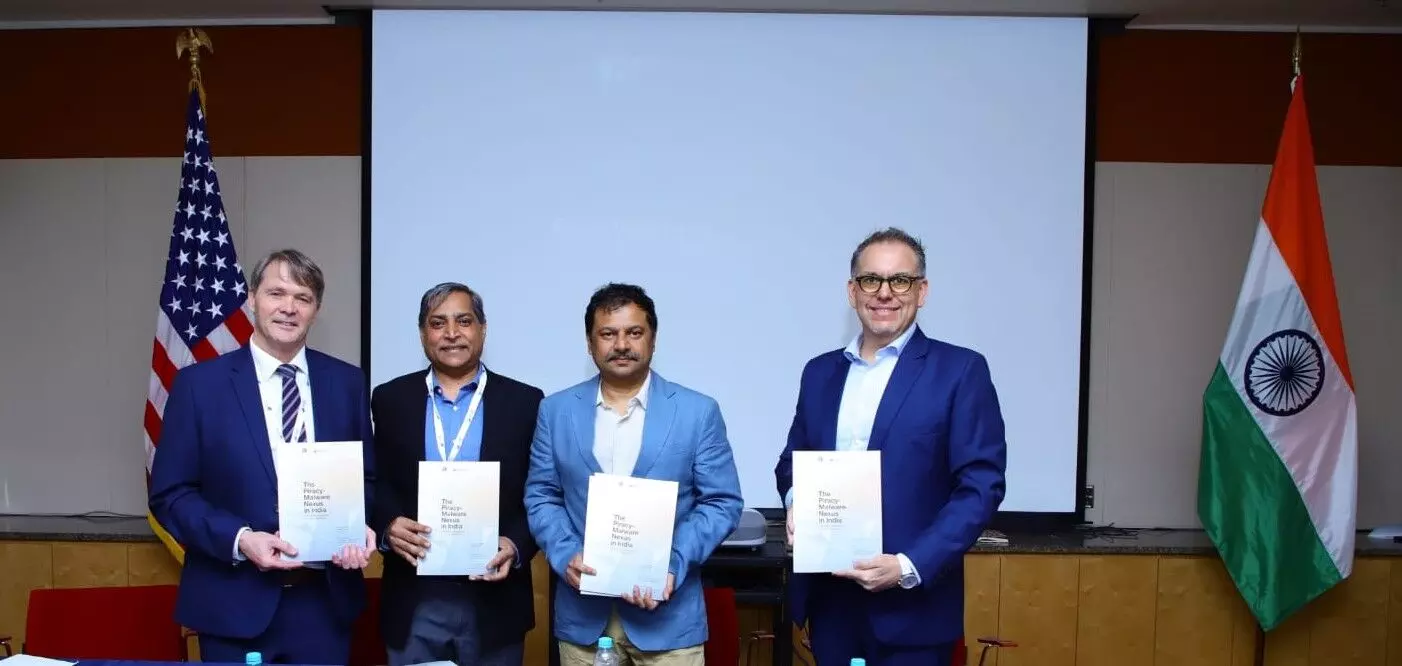Piracy sites pose highest risk of malware infection: ISB study on cybersecurity
Cybercrime experts at the ISB recommend Indian government prioritise digital copyright regulation and cybersecurity trainings
image for illustrative purpose

Hyderabad, March 19: The piracy websites are a predominant threat to Indian consumers, with a significant 59 per cent risk of malware infection, says a ground-breaking study by cybersecurity experts at the Indian School of Business (ISB). At particular risk is the 18-24 age group, which exhibits low awareness levels of cyber risks despite frequent engagement with these platforms.
Co-authored by Professor Manish Gangwar and Dr Shruti Mantri from the ISB Institute of Data Science (IIDS), and Dr Paul Watters, Adjunct Professor of Cybersecurity at La Trobe University, Melbourne, the research titled ‘The Piracy-Malware Nexus in India: A Perceptions and Experience and Empirical Analysis’ was launched in collaboration with Alliance for Creativity and Entertainment (ACE) and the United States Patent and Trademark Office (USPTO) at the US Consulate General in Mumbai on Tuesday.
The report was released by Brijesh Singh, Principal Secretary, Chief Minister’s office, Government of Maharashtra; John Cabeca, US Intellectual Property Counselor for South Asia, United States Department of Commerce; Neil Gane, Head of Regional Operations, Asia-Pacific Region, Alliance for Creativity and Entertainment and Prof Manish Gangwar, Executive Director, ISB Institute of Data Science.
According to the report, accessing piracy sites carries a higher risk of malware infection (59 per cent) compared to the adult industry (57 per cent) and gambling advertisements (53 per cent). Analysis of 150 websites using VirusTotal revealed cyber risk categories such as malicious content, malware, suspicious activity, phishing attempts, and spam.
Scam piracy websites pose a greater risk of exposing users to cyber threats compared to standard piracy sites, particularly popular ones. Online piracy in India remains profitable, with malware distribution serving as an additional revenue stream for piracy site operators. These findings highlight that Indian consumers underestimate their true cyber risk when using piracy sites, emphasising the urgent need to address cybersecurity threats associated with piracy websites.
Prof Manish Gangwar, Executive Director, ISB Institute of Data Science underlined, “There is a need for a three-pronged approach to deal with the menace: Regulation, Education and Detection (RED). This should include stringent laws and regulations to punish the culprits; educate masses about the threat of using pirated stuff; and use of technology to detect and block these websites.”
Dr Paul Watters, Adjunct Professor of Cybersecurity at La Trobe University, Melbourne, commented: “The results of the study clearly show a very high risk of cyber threat to Indian consumers from accessing piracy sites and services. I believe that the situation can be effectively tackled by increasing the capability and scope of law enforcement in India.”
The study provided essential recommendations to mitigate the risk of accessing piracy sites and protect Indian consumers. These include prioritising the addressing of digital copyright crimes by the Indian government, which involves offering adequate training and resources to law enforcement agencies to bring offenders to justice and provide a visible deterrent. Additionally, implementing targeted awareness campaigns, particularly aimed at consumers aged 18-24, is essential to discourage engagement with piracy websites and risky cyber behaviour.
“The research findings align with what ACE has observed over the years: accessing pirated content online puts consumers at great risk for scams and poses a threat to the security of their private data,” said Karyn Temple, Senior Executive Vice President and Global General Counsel for the Motion Picture Association.
ACE is the world’s leading online antipiracy organisation, powered by a global network of over 50 media and entertainment companies. “We remain committed to our relentless pursuit of content piracy operators in India and look forward to continued collaboration with the Indian authorities and regional law enforcement,” added Temple.
As part of the study, a survey was conducted from May 23 to 29, 2023, and included 1,037 respondents in India as part of the YouGov National Omnibus. Data was weighted to represent the online population aged 18+, selected based on demographic characteristics proportional to adult citizen frequency in India.

